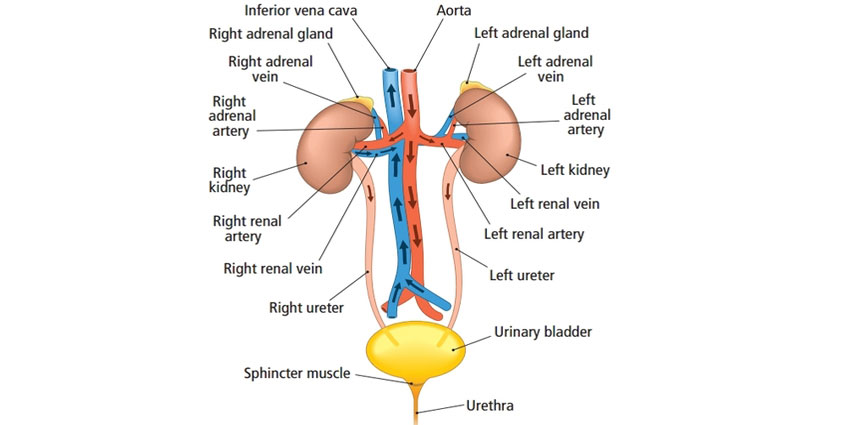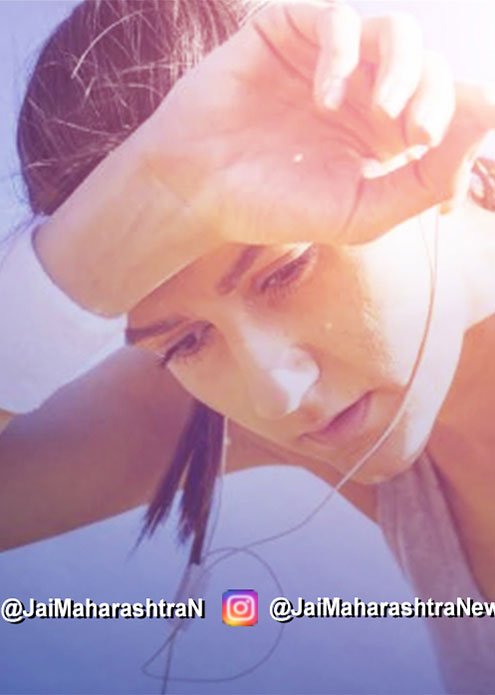

Excretory System _SUP
The Excretory System is a very important structure in the body. The Excretory System of an organism performs the vital function of excretion i.e. the process of discharging wastes that are produced from normal life processes from the body. This system is responsible for the elimination of wastes produced by homeostasis.
To remove solid waste from the body, it is also important to get rid of fluids. The well known result of the Excretory System is urine. Urine is the by-product of the Excretory System that balances the amount of water and salts in the body.
It is vital to excrete waste products such as carbon dioxide. If they are allowed to accumulate they cause poisoning which slows down vital chemical reactions in the body.
There are several parts of the body that are involved in this process viz. sweat glands, liver, lungs and kidney system. Organs of excretion make up the Excretory System. They include the kidneys, large intestine, liver, skin and lungs. The kidneys filter blood and form urine. They are part of the urinary system, which also includes the ureters, bladder and urethra.
Interacting with other systems, the digestive system works very closely with the circulatory system, to get the absorbed nutrients distributed throughout the body. While the digestive system collects and removes undigested solids, the excretory system filters compounds from the blood stream and collects them in urine.
Common disorders under the Excretory System
- Dysentery
- Irritable Bowel Syndrome
- Cholera
- Piles
- Fistula
- Kidney Stones
- Painful Mictrition or Dysurea
- Obstructed Micturition
- Diarrhoea
- Noctural Enures
- Stress and Urge
- Chronic Renal Failure
- Benign Prostatic Hypertrophy
- Renal Calculi
- Recurrent UTI
Role of Modern medicine in treatment of Excretory System disorders under Sanyukta Upchaar Paddhati®
In Sanyukta Upchaar Paddhati®, sometimes painkillers are beneficial for instant relief from pain. Once the pain becomes bearable, further course of treatment can be planned and carried out.
Role of Ayurveda and Panchakarma in treatment of Excretory System disorders under Sanyukta Upchaar Paddhati®
At Vedicure, Ayurveda is an important arm in treatment of any ailment. Under Ayurveda, according to the patient’s prakkruti and bala (strength), there is Shodhan and Shaman Chikitsa. In Shodhan treatment (detoxification), Snehan, Swedan, Vaman, Virechan and Basti are included. For Swedavaha strotas, Udvartan is given by rubbing the medicated powder on the skin. And for treating piles and fistula, Awagaha Swed (decoction of medicated herbs sitz bath) is considered the best treatment that gives curing results to the patients.
Shaman Chikitsa means oral herbal/Ayurvedic medicines according to specific ailments and needs.
Role of Acupuncture in treatment of Excretory System disorders under Sanyukta Upchaar Paddhati®
At Vedicure, Acupuncture is one of the therapies that are used widely in treating ailments related to the Excretory System. Acupuncture helps to increase blood flow to the kidneys. This enhances hypoxic ischemic state in the kidneys which improves damaged kidneys inherent cells. It is effective in controlling overactive bladder syndrome. It improves the Voiding function (urine passing) in case of Neurogenic Urinary Retention.
Through Acupuncture it is easy to cure cases of Cauda Equine Injury (injury to the base of the spinal cord) by improving energy balance and blood circulation to the urinary system.
Role of Physiotherapy in treatment of Excretory System disorders under Sanyukta Upchaar Paddhati®
With the help of Physiotherapy patients can be made aware about the benefits of drinking and voiding schedule. This therapy includes Physio Exercises and Physio machine to overcome ailments. Physiotherapy helps strengthen pelvic floor, abdominal and Sphincter muscle through exercise. Machine therapies are used like Ultrasound, TENS to stimulate the muscles and nerves. Short Wave Diathermy and Wax Therapy is used to manage pain.
Physio exercises strengthen the muscles specifically related to the Excretory System improving the intestitial muscle strength.
Role of Yoga and Pranayam in treatment of Excretory System disorders under Sanyukta Upchaar Paddhati®
At Vedicure, Yoga & Pranayam go hand in hand with other therapies in treatment of ailments related to the Excretory System. For improving and maintaining the health of the Excretory System, regular practice of Pranayam; Anulom-Vilom, Bhramari, Omkar and Kapalbhati are beneficial. Yogic asanas like Pavanmuktasan, Naukasan, Vajrasan, Sarvangasan, Shalbhasan, Dhanurasan, Makarasan, Bhadrasan, Chakrasan, Paschimottasan, Suryanamaskar and Ashiwini Mudra give positive results.
For relief from constipation, Uddiyan Bandh and Moola Bandh are useful. Whereas, Uddiyan Bandh and Bhasrika Pranayam are recommended to treat urinary disorders.
Role of Diet in treatment of Excretory System disorders under Sanyukta Upchaar Paddhati®
Very spicy, chilly, fermented, junk and outside food, bakery products, etc. need to be avoided during treatment of Excretory System ailments. This diet regime is also necessary to maintain good health. Intake of sufficient water as per thirst, seasonal fruits and Saatvik and healthy diet is strongly recommended.
Role of Reiki in treatment of Excretory System disorders under Sanyukta Upchaar Paddhati®
Reiki is a positive energy that accelerates the healing and rejuvenation process. Reiki detoxifies and cleans physically, mentally and emotionally by releasing suppressed or accumulated toxins of the mind and body.
Reiki is very beneficial in treatment of disorders related to the Excretory System. For instance, after a major accident, a patient may have loss of sensation of urine and stools. Reiki is helpful in treating such and similar conditions.

